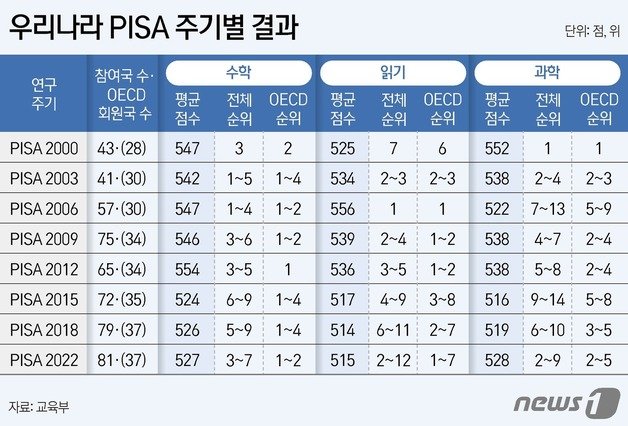 ⓒ News1
ⓒ News1Although Korean students’ international academic achievement rankings have risen, scores in each area appear to be on the decline.
In particular, the rise in academic achievement rankings appears to be largely due to the significant decline in scores in other countries due to the COVID-19 pandemic, and it is pointed out that improvements in the curriculum and teaching and learning areas, such as guaranteeing basic academic ability, are needed.
According to the Ministry of Education and the Korea Institute for Curriculum and Evaluation on the 6th, as a result of the 2022 International Student Assessment of Academic Achievement (PISA) announced by the Organization for Economic Co-operation and Development (OECD), Korean students ranked highest among OECD member countries in all areas of mathematics, reading, and science.
Among OECD member countries, it ranked 1st to 2nd in mathematics (1st to 4th in PISA2018), 1st to 7th in reading (2nd to 7th in PISA2018), and 2nd to 5th in science (3rd to 5th in PISA2018).
The average score of Korean students was 527 points in math, 515 points in reading, and 528 points in science. Compared to PISA 2018, science increased by 9 points, but math and reading only increased by 1 point each.
It is analyzed that the increase in academic achievement of Korean students is due to a significant decrease in the average scores of students in other countries.
An official from the Ministry of Education said, “It is difficult to evaluate that the level of Korean students has improved significantly in terms of scores. “As the scores of students from OECD member countries have dropped significantly, their rankings appear to have remained similar to the previous evaluation results,” he said.
Song Gyeong-won, a policy member of the Justice Party, said, “It can be seen as the power of private education. He pointed out, “During the COVID-19 pandemic, students in the upper middle class and above who actively used private education maintained or raised their grades, but there were many indications that the grades of those in the lower middle class and below declined,” adding, “For this reason, the average score may have been maintained.”
Although Korean students maintained their academic achievement despite the COVID-19 incident, the average score in each area has continued to decline since the 2000 survey.
The average math score of Korean students was 547 points at the time of PISA2000, but continued to decline, falling to 524 points in PISA2015, and slightly recovering to 527 points in PISA2022.
The reading score rose to 525 points in PISA2000 and 556 points in PISA2006, but then continued to decline and fell to 514 points in PISA2018, increasing by 1 point in this survey.
The science score peaked at 552 points in PISA2000 and then fluctuated, reaching a low of 516 points in PISA2015, and despite an upward trend, it only recorded 528 points in PISA2022.
Policy Committee Member Song said, “Korea’s rise in the ranking is certainly meaningful, but it could also be due to the sluggish performance of other countries. It means that there were fewer gaps in school education in Korea, either because of non-face-to-face classes during the Corona period or because education began on a large scale in the second half of 2021.” “It appears to be thanks to the comprehensive recovery plan,” he analyzed.
Source: Donga
Mark Jones is a world traveler and journalist for News Rebeat. With a curious mind and a love of adventure, Mark brings a unique perspective to the latest global events and provides in-depth and thought-provoking coverage of the world at large.